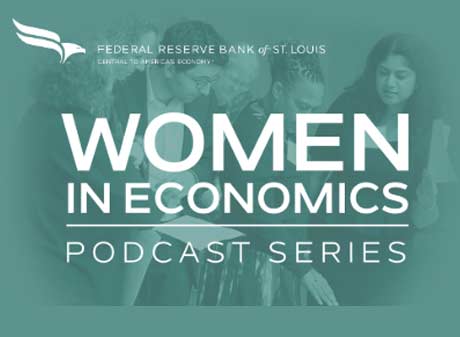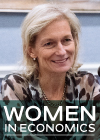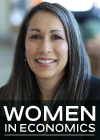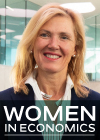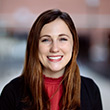Why I Pursued an Economics Career: Stories from Three Prominent Women
The St. Louis Fed’s Women in Economics Podcast Series launched in 2018 and has profiled more than 30 outstanding women making their marks in the fields of economics.
Some work in business, media or academia, while others have found prominence in government or the Federal Reserve System.
Like their career paths, the stories of how they got into economics are all unique. Here are excerpts from three recent interviews with Zanny Minton Beddoes, Tisha Emerson and Beatrice Weder di Mauro.
Perceiving the Power of Free Markets
Zanny Minton Beddoes is the first female editor-in-chief of The Economist and is ranked on the Forbes’ Most Powerful Women list. Her lifelong interest in economics was propelled in part by a trip to Poland with a group of peers. To secure it, she recalled talking her way into an internship.
“I heard that Professor [Jeffrey] Sachs was taking this group of interns to Poland. And this was one of those extraordinary lucky moments. … He had office hours one day, and I went and knocked on the door and introduced myself and said, rather improbably, that I speak German and I speak Russian, and Polish is kind of in the middle. And that I had done some agricultural economics, and there’s a very big agricultural sector in Poland.
“Somehow, I talked my way into convincing him to let me join his intern program, and I went to Poland for the summer.”
The trip happened at a time when a new government had taken over and freed the markets.
“I had this really powerful, visible sense of what liberalizing markets does. It was transformative. It was a way that brought the stuff I’d learned in classes to life and made it very real. I could see people’s lives changing very dramatically.”
Minton Beddoes’ career has been characterized by seizing opportunities, and she encourages other people to do the same.
“I’ve only ever regretted the things I’ve not done. But my advice to anyone is just grab every opportunity you can. I think very rarely will you regret grabbing an opportunity. If it doesn’t work out, that’s fine. You can go and do something else.”
Falling in Love with the Subject of Economics
Tisha Emerson, professor of economics at Baylor University, has done research on the gender gap in economics and uses active learning techniques to help lessen that gap.
Her passion for the subject was sparked by a principles of microeconomics course she took in college, which steered her away from her planned mathematics major and toward economics.
“I felt every day like I was sitting on the edge of my seat. I was just so engaged. And I saw how economics could use the math that I loved, so it had the reasoning and the elegance of the math and the logic, but then it also had applications to important, real-world questions.”
She said she hopes other students find the same inspiration, whatever they decide to study.
“What I would like is for every student to find the discipline that makes them feel like I felt in my first economics class, that makes them feel like they are sitting on the edge of their seat and they cannot wait to hear the next topic their professor's going to cover, where they don't feel like their homework is work, that they just are so enthralled by this.
“My hope is that students will not settle, but that they will look for the thing that makes them feel that way.”
The active learning techniques she uses in her classes help with teaching about topics like supply and demand, the effects of price controls, and externalities.
“It's very different from me just explaining the concepts to them and maybe having them work through some problems, but instead to really see the market in action for themselves.”
Emerson encourages other instructors to also use these methods in order to help show that economics is a broad subject and can be applied to other areas, including the topics of environmental issues, law and health.
“There are just so many interesting questions out there, and sometimes that might get lost in your standard principles class.”
Growing Up in Two Different Worlds
Beatrice Weder di Mauro, president of the Centre for Economic Policy Research, grew up in Guatemala but was born in and often visited Switzerland. Seeing the countries’ two different economies firsthand helped lead her to study economics.
“I was confronted with a huge gap in income between Switzerland and Guatemala. Not only in income but also in trajectory because Guatemala is one of those countries that really has not succeeded in improving its quality of life for its people over decades.
“So, that certainly was one of the inspirations for studying economics. Because it became clear to me that this has a lot to do with good and bad policies.”
She encourages more women to enter the field of economics through the Women in Economics initiative video series, which is a partnership between the Centre and the bank UBS.
Encouraging women to enter the field is just one step in increasing diversity in the subject area, she said.
“What is even more important is that we don’t lose them on the way. And, why would you not want to lose the women? Well, of course, they are important in terms of their resources, in terms of their diversity. …
“My own experience suggests what also the studies suggest: Namely, that diversity does improve quality.”
This blog explains everyday economics and the Fed, while also spotlighting St. Louis Fed people and programs. Views expressed are not necessarily those of the St. Louis Fed or Federal Reserve System.
Email Us


